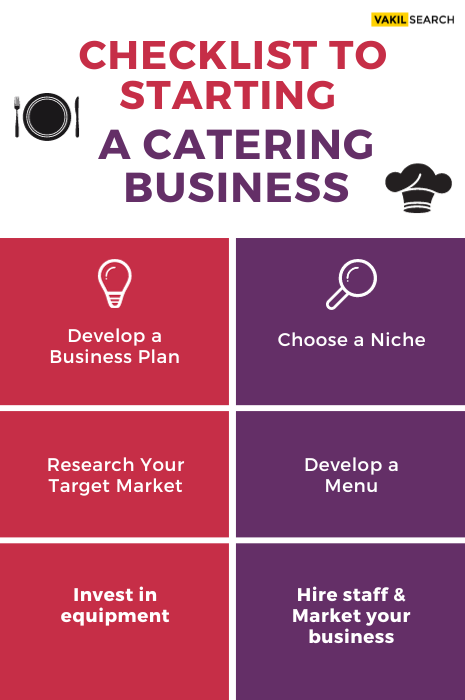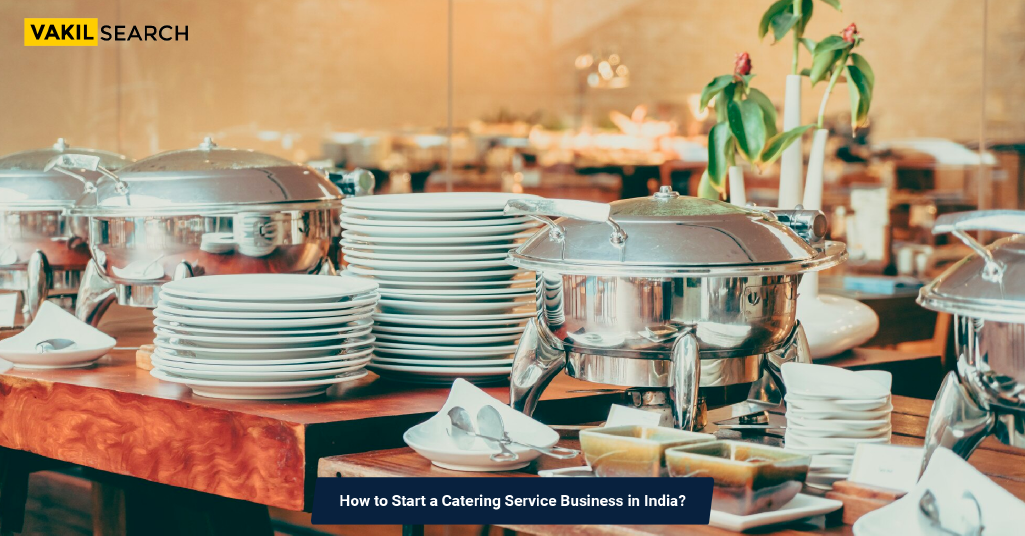Learn how to launch a successful catering business in India. Discover essential steps, legal requirements, and market insights. Get clarity about the same now.
Scope of Catering Service Business in India
The catering service business in India is a growing industry with immense potential. The country has a large and growing population and a growing middle class with disposable incomes. This leads to an increased demand for catering services for various events, such as weddings, parties, corporate events, and festivals.
In addition, the Indian government is promoting tourism and holding more international events, further boosting the demand for catering services.
Requirements for Starting a Catering Business
The following are the basic requirements for starting a catering service business in India:
- Business registration: You need to register your business with the appropriate authorities, such as the Registrar of Companies (ROC) or the Ministry of Micro, Small and Medium Enterprises (MSME).
- Food safety license: You need to obtain a food safety license from the Food Safety and Standards Authority of India (FSSAI).
- GST registration: If your annual turnover is more than ₹40 lakh, you need to register for GST (Goods and Services Tax).
- Other permits and licenses: Depending on your location and type of business, you may also need to obtain other permits and licenses, such as a trade license, a fire safety license, and a health license.
Checklist to Starting a Catering Business

Here is a checklist to help you start a catering business in India:
- Develop a business plan, including your business goals, strategies, and financial projections.
- Choose a niche: What type of catering services do you want to offer? Will you focus on corporate catering, social catering, or both?
- Research your target market: Who are your ideal customers? What are their needs and preferences?
- Develop a menu: What dishes will you offer? Make sure your menu is varied and affordable.
- Invest in equipment: You will need to invest in commercial kitchen equipment, such as stoves, ovens, refrigerators, and freezers. You may also need to purchase catering equipment, such as tables, chairs, and serving ware.
- Hire staff: You will need to hire staff to help you prepare and serve food. You may also need to hire drivers to deliver food to your customers.
- Market your business: Let people know about your catering business. You can market your business through online and offline channels, such as social media, networking, and advertising.
Documents Required for Registering Catering Services
The following documents are required for registering catering services in India:
- Application form: The application form can be downloaded from the website of the Food Safety and Standards Authority of India (FSSAI).
- Proof of identity: This could be a copy of your passport, Aadhaar card, or driver’s license.
- Proof of address: This could be a copy of your utility bill or rental agreement.
- Partnership deed or certificate of incorporation: This is required if you are registering a partnership or company.
- Food business plan: This should include a description of your business, your food safety management system, and your menu.
- List of food products: This is a list of all the food items that you will be preparing and selling.
- Bank account information: This is required for paying the registration fee.
Process to Start Catering Business in India
The following is a step-by-step process to start a catering business in India:
- Choose a business structure: Will you be operating as a sole proprietorship, partnership, or company?
- Register your business: You need to register your business with the appropriate authorities, such as the Registrar of Companies (ROC) or the Ministry of Micro, Small and Medium Enterprises (MSME).
- Obtain a food safety license: You need to obtain a food safety license from the Food Safety and Standards Authority of India (FSSAI).
- Register for GST: If your annual turnover is more than ₹40 lakh, you need to register for GST (Goods and Services Tax).
- Obtain other permits and licenses: Depending on your location and type of business, you may also need to obtain other permits and licenses, such as a trade license, a fire safety license, and a health license.
- Invest in equipment: You will need to invest in commercial kitchen equipment, such as stoves, ovens, refrigerators, and freezers. You may also need to purchase catering equipment, such as tables, chairs, and serving ware.
- Hire staff: You will need to hire staff to help you prepare and serve food. You may also need to hire drivers to deliver food to your customers.
- Market your business: Let people know about your catering business. You can market your business through online and offline channels, such as social media, networking, and advertising.
Required Permits and Licenses
The following are the required permits and licenses for catering services in India:
- Food safety license from the Food Safety and Standards Authority of India (FSSAI)
- Trade license from the local municipal corporation
- Fire safety license from the local fire department
- Health license from the local health department
You may also need to obtain other permits and licenses, depending on your location and type of business. For example, if you are catering to events with alcohol, you will need to obtain a liquor license.
Registrations Required for Catering Business in India
The following registrations are required for a catering business in India:
- Food Safety and Standards Authority of India (FSSAI) License: This is a mandatory license for all food businesses in India. It can be obtained online or through the FSSAI office.
- Goods and Services Tax (GST) Registration: If your annual turnover is more than ₹40 lakh, you need to register for GST.
- Trade License: This is a license issued by the local municipal corporation. It is required for all businesses that operate within the municipal limits.
- Fire Safety License: This is a license issued by the local fire department. It is required for all businesses that operate on premises that are prone to fire hazards.
- Health License: This is a license issued by the local health department. It is required for all businesses that involve the handling of food.
In addition to the above registrations, you may also need to obtain other permits and licenses, depending on the nature of your business. For example, if you are catering to events with alcohol, you will need to obtain a liquor license.
Legal Considerations for Operating a Catering Service Business in India
There are a number of legal considerations that you need to be aware of when operating a catering service business in India. These include:
- Food Safety and Standards Act, 2006: This Act regulates the food industry in India and sets out the standards for food safety.
- Consumer Protection Act, 2019: This Act protects the rights of consumers and provides them with remedies in case of defective goods or services.
- Goods and Services Tax Act, 2017: This Act levies a tax on the supply of goods and services in India.
- Labour Laws: There are a number of labor laws that apply to businesses in India. These laws regulate the employment of workers and set out their minimum wages and other benefits.
It is important to comply with all applicable laws and regulations when operating a catering service business in India. Failure to do so may result in penalties and fines.
Catering Business FAQs
What is catering and its types?
Catering is the business of providing food and beverage services for special events, such as weddings, corporate events, and parties. Catering services can be provided at a variety of locations, including restaurants, hotels, banquet halls, and private homes. There are many different types of catering services, including:
- Social catering: This type of catering is for social events, such as weddings, birthdays, and anniversaries.
- Corporate catering: This type of catering is for corporate events, such as conferences, seminars, and trade shows.
- Event catering: This type of catering is for special events, such as festivals, concerts, and sporting events.
- Mobile catering: This type of catering is provided by a mobile kitchen, such as a food truck or trailer.
- Boxed lunches: This type of catering provides individual boxed lunches that can be delivered to offices, homes, or other locations.
What is a vending service in catering?
Vending service in catering is the provision of food and beverage services through vending machines. Vending machines can be placed in a variety of locations, such as offices, schools, hospitals, and public buildings. Vending services can offer a variety of food and beverage items, including snacks, drinks, and meals. Vending services can be a convenient and affordable way for people to get food and drinks.
How important is catering service?
Catering services are important because they provide food and beverage services for special events. Special events are often times to celebrate important occasions, such as weddings, birthdays, and anniversaries. Catering services can help to make these events special and memorable. Catering services can also be important for corporate events. Corporate events are often used to build relationships with clients and partners. Catering services can help to make these events more enjoyable and productive.
Who is a good caterer?
A good caterer is someone who can provide high-quality food and beverage services at a reasonable price. A good caterer will also be able to customize their services to meet the specific needs of their clients. When choosing a caterer, it is important to consider the following factors:
- Experience: How long has the caterer been in business? Do they have experience catering to events of your size and type?
- Reputation: What do other customers say about the caterer? Are they known for their high-quality food and service?
- Menu: Does the caterer offer a variety of food and beverage options? Can they customize their menu to meet your specific needs?
- Price: Is the caterer's pricing competitive? Do they offer discounts for large events or multiple bookings?
What are the duties of catering staff?
The duties of catering staff vary depending on the type of catering event and the size of the catering company. However, some common duties of catering staff include:
- Preparing and cooking food
- Setting up and serving food
- Cleaning up after the event
- Providing customer service
What is kitchen catering?
Kitchen catering is a type of catering that is provided from a commercial kitchen. Kitchen catering companies typically have a large menu of food and beverage options available. They can also customize their menus to meet the specific needs of their clients. Kitchen catering is a good option for events that require a large amount of food or for events that have specific dietary restrictions. Kitchen catering companies can also provide additional services, such as delivery and set-up.










